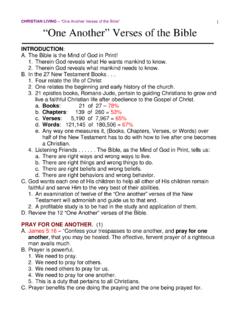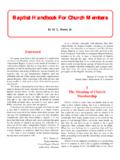Transcription of One Hundred Scriptural Arguments for the …
1 One Hundred Scriptural Arguments for the unitarian Faith Boston: American unitarian Association By: Samuel Barrett (1825) unitarian Christians believe Jesus Christ to be the Son of God and the Saviour of men. They believe in the divinity of his mission and in the divinity of his doctrines. They believe that the Gospel which he proclaimed came from God; that the knowledge it imparts, the morality it enjoins, the spirit it breathes, the acceptance it provides, the promises it makes, the prospects it exhibits, the rewards it proposes, the punishments it threatens, all proceed from the Great Jehovah. But they do not believe that Jesus Christ is the Supreme God. They believe that, though exalted far above all other created intelligences, he is a being distinct from, inferior to, and dependent upon, the Father Almighty.
2 For this belief they urge, among other reasons, the following Arguments from Scripture. 1. Because Jesus Christ is represented by the sacred writers to be as distinct a being from God the Father as one man is distinct from another. It is written in your law, that the testimony of two men is true. I am one who bear witness of myself, and the Father that sent me beareth witness of me (John 8:17 and 18). 2. Because he not only never said that himself was God, but, on the contrary, spoke of the Father, who sent him, as God, and as the only God. This is life eternal, that they might know Thee, the only true God, and Jesus Christ whom thou hast sent (John 17:3). This language our Saviour used in solemn prayer to his Father and our Father.
3 3. Because he is declared, in unnumbered instances, to be the Son of God. And lo, a voice from heaven, saying, this is my beloved Son, in whom I am well pleased (Matt. 3:17). Can a son be coeval (the same age) and the same with his father? 4. Because he is styled the Christ, or the anointed of God. God anointed Jesus of Nazareth with the Holy Ghost and with power (Acts 10:38). Is he who anoints the same with him who is anointed? 5. Because he is represented as a Priest. Consider the ..High-Priest of our profession, Christ Jesus (Heb. 3:1). The office of a priest is to minister to God. Christ, then, as a priest, cannot be God. 6. Because Christ is Mediator between the One God, and men. For there is one God, and one Mediator between God and men, the man Christ Jesus (1 Tim.)
4 2:5). 7. Because, as the Saviour of men, he was sent by the Father. And we have seen and do testify that the Father sent the Son to be the Saviour of the world (1 John 4:14). 8. Because he is an Apostle appointed by God. Consider the Apostle,..Christ Jesus, who was faithful to him that appointed him (Heb. 3:1 and 2). 9. Because Christ is represented as our intercessor with God. It is Christ that died, yea, rather, that is risen again, who is even at the right hand of God, who also maketh intercession for us (Rom. 8:34). 10. Because the head of Christ is God. I would have you know, that the head of every man is Christ; and the head of every woman is the man; and the head of Christ is God (1 Cor. 11:3). 11. Because, in the same sense in which we are said to belong to Christ, Christ is said to belong to God.
5 And ye are Christ s; and Christ is God s (1 Cor. 3:23). 12. Because Christ says, My father is greater than all (John 10:29). Is not the father, then greater than the son? 13. Because he affirms, in another connection, and without the least qualification, My Father is greater than I (John 14:28). 14. Because he virtually denies that he is God, when he exclaims, Why callest thou me Good? There is none good but one, that is God (Matt. 19:17). 15. Because our Saviour, after having said, I and my Father are one, gives his disciples distinctly to understand that he did not mean one substance, equal in power and glory, but one only in affection and design, as clearly appears from the prayer he offers to his Father in their behalf, -- that they all may be one; as thou, Father, art in me, and I in thee, that they also may be one in us (John 17:21).
6 16. Because the Father is called the God of Christ as he is the God of Christians. Jesus saith unto her, ..Go to my brethren, and say unto them, I ascend unto my Father and your Father; and to my God and your God (John 20:17). 17. Because an Apostle says of God, in distinction from the Lord Jesus Christ, that He is the only Potentate, and that He only hath immortality (1 Tim. 6:15 and 16). 18. Because it is the express declaration of the same Apostle, that the Father is the one God, and there is none other. Though there be that are called Gods, whether in heaven or in earth, (as there be gods many, and lords many,) yet to us there is but one God, the Father, of whom are all things (1 Cor. 8:5 and 6). 19. Because the power which Christ possessed was, as him affirmed, given to him.
7 All power is given unto me (Matt. 28:18). 20. Because he positively denies himself to be the author of his miraculous works, but refers them to the Father, or the holy spirit of God. The Father that dwelleth in me, he doeth the works (John 14:10). If I cast out devils by the spirit of God (Matt. 12:28). 21. Because he distinctly states, that these works bear witness, not to his own power, but that the Father had sent him (John 5:36). 22. Because he expressly affirms that the works were done, not in his own name, but in his Father s name (John 10:25). 23. Because he asserts, that him hath God the Father sealed, to God the Father he was indebted for his credentials (John 6:27). 24. Because he declares that he is not the author of his own doctrine.
8 My doctrine is not mine, but his that sent me (John 7:16 and 17). 25. Because he represents himself as having been instructed by the Father. As my Father hath taught me, I speak these things (John 8:28). 26. Because he refers invariable to the Father as the origin of the authority by which he spoke and acted. The Father hath given to the Son authority (John 5:26 and 27). 27. Because he acknowledges his dependence on his heavenly Father for example and direction in all his doings. The Son can do nothing of himself, but what he seeth the Father do (John 5:19). The Father loveth the Son, and showth him all things that himself doeth (John 5:20). 28. Because he says, I seek not mine own glory; but I honor my Father (John 8:49 and 50).
9 29. Because he declares, If I honor myself, my honor is nothing: it is my Father that honoreth me (John 8:54). 30. Because an Apostle declares, that in Christ dwelt all fullness, because it so pleased the Father (Col. 1:19). 31. Because Christ is uniformly represented in the Scriptures, not as the primary, but the intermediate cause of all things relating to our salvation. One God, the Father, of whom are all things, and we in him; and one Lord Jesus Christ, by whom are all things, and we by him (1 Cor. 8:6). 32. Because he declares, I am not come of myself into the world, for I proceeded forth and came from God (John 8:42; 7:28). Jesus that he came from God, and went to God (John 13:3). 33. Because he affirms that he had not the disposal of the highest places in his own kingdom.
10 To sit on my right and on my left is not mine to give, but it shall be given to them for whom it is prepared of my Father (Matt. 20:23). 34. Because our Saviour, referring his disciples to a future time, when they would understand more accurately concerning him, expressly declares that then they would know him to be entirely dependent upon the Father. When ye have lifted up the Son of man ( crucified him), then shall ye know that I am he ( the Messiah), and that I do nothing of myself, but as my Father hath taught me, I speak these things" (John 8:28). 35. Because our Saviour always professed to have no will of his own, but to be ever entirely guided and governed by the will of his heavenly Father. For I came down from heaven, not to do mine own will, but the will of him that sent me (John 6:38).










